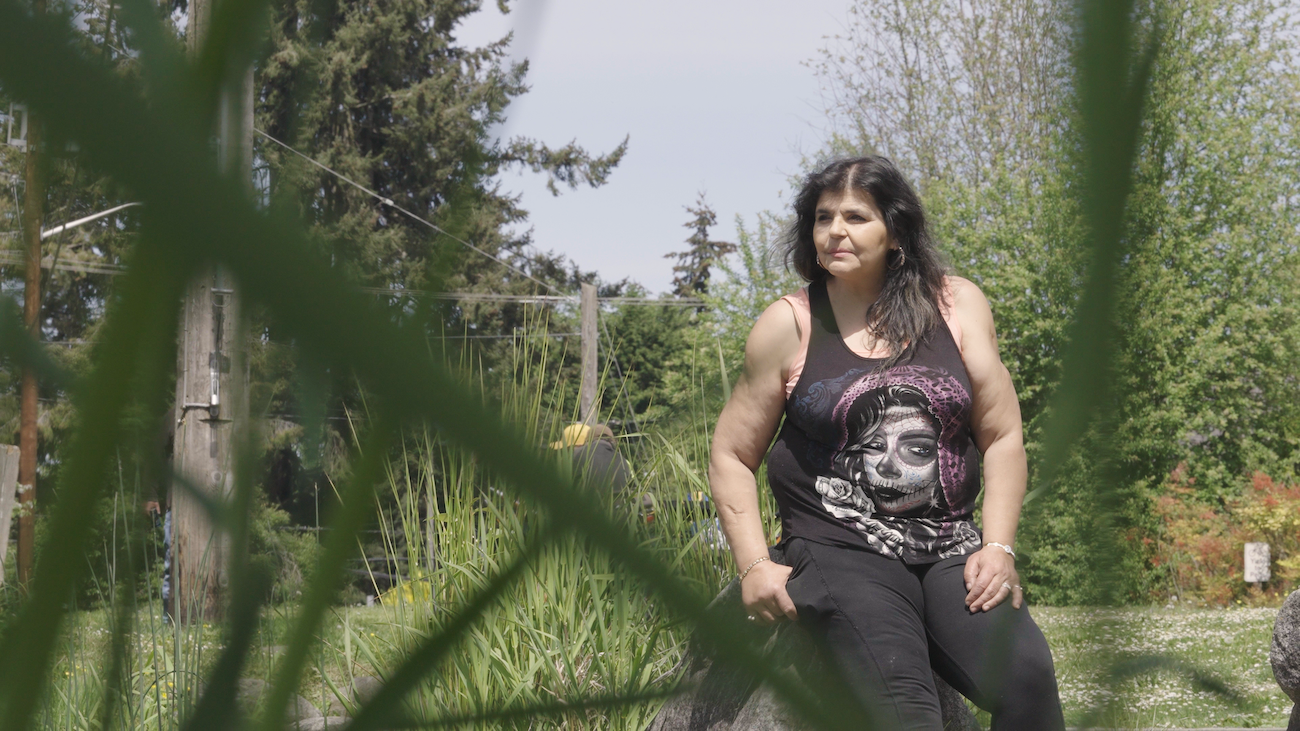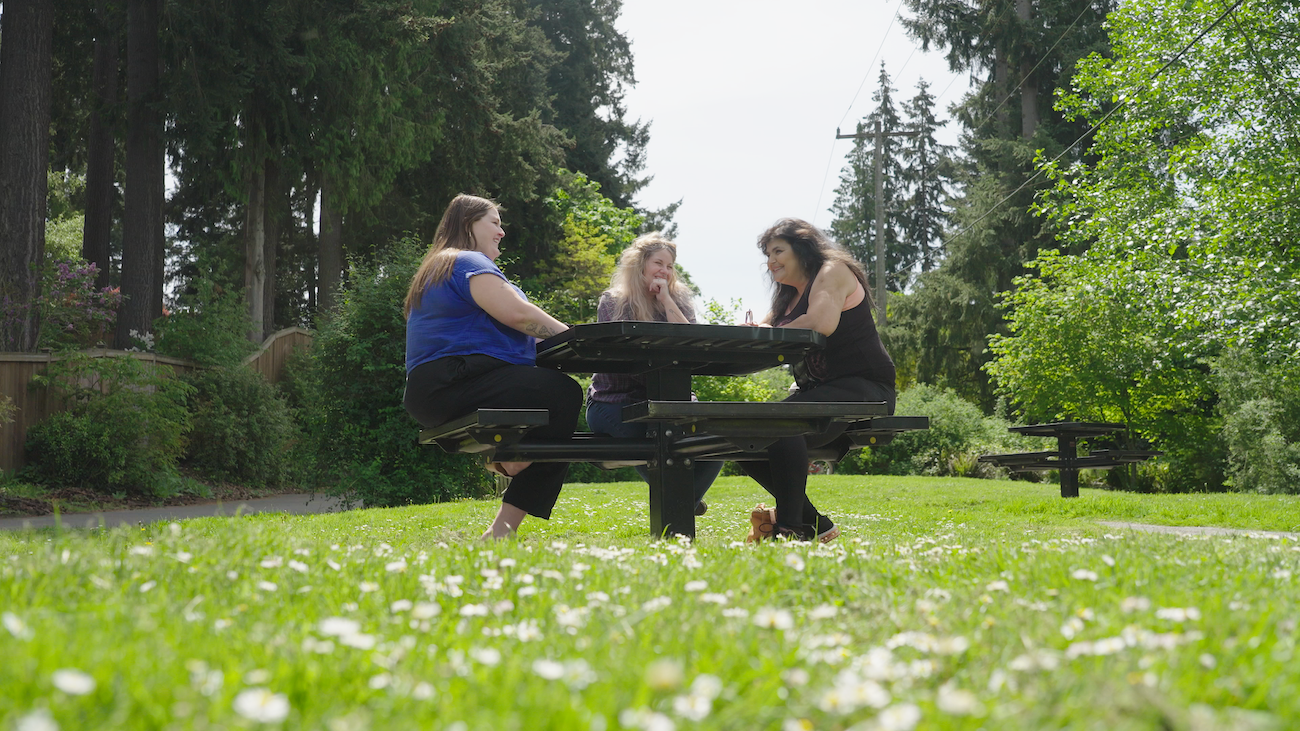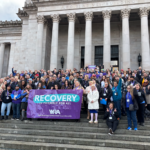
Our clients move mountains to make changes that work for them, achieve goals on their terms, and stay in treatment. We’ve walked alongside our participants as they crest peaks and navigate valleys for more than 50 years.
Join us at this year’s Roots of Recovery gala to support ETS patients and staff through every switchback on the journey.
Maria’s struggle with harmful substance use began early in her life.
Born in Greece and having moved to the United States as a toddler, Maria’s childhood was a time of intense change and trauma. Maria experienced years of physical, mental, and sexual abuse starting at 8 years old. While facing abuse at home, she often struggled when she went to school, fighting with other students or causing disruptions in the classroom. At 12 years old, Maria began drinking alcohol and taking pills to cope with what she was experiencing. That same year, Maria decided to leave her home with her friend Joanne and live in downtown Seattle. “I basically came from a sheltered life. It was abusive, but it was sheltered,” Maria shared. “So, I went from that to being in downtown Seattle. And that was really hard at 12 years old to figure out.”
From losing close friends like Joanne to the Green River Killer to experiencing extreme violence while in downtown Seattle, Maria’s substance use eventually grew from alcohol to cocaine and heroin, and she began selling drugs. At 20 years old, Maria moved back to Everett, Washington where she attempted to stop using. “I really thought that I could live a normal life,” she said. “I didn’t realize drugs were a problem back then. Even though I was using them on the daily.”
Shortly after in 1986, Maria became pregnant with her first child. Maria continued to use and sell drugs while pregnant until she gave birth to her daughter, who then struggled with withdrawal symptoms. Maria hid her use from doctors and others, fearful of their response. “My daughter was born in withdrawal from cocaine and nobody knew,” she said. “You see her trembling and you see her withdrawal, and I still didn’t tell anybody. I was afraid to tell anybody. But somehow, I always justified what I was doing.” Maria eventually lost custody of her daughter when she was 2 years old.
As years passed, Maria continued to use, feeling like she couldn’t slow down. “I lived life every day like it was my last day,” she said. “All I thought about was how to get my next fix.” During this time, Maria experienced intense trauma in the form of extreme physical and sexual violence, houselessness, and more, often feeling as though she was to blame. “It’s about learning to get your next hit and dealing with all the pain that comes along with it,” she said. “I never realized how important I was.”
“I kept trying to run away from the drugs, but the drugs were always there.”
While living unhoused, Maria often stayed in hospitals or institutions, eventually running into issues with law enforcement and then staying in jails and prisons. Maria eventually left Washington and traveled to different states, but would continue to get arrested. “My addiction took me across the country,” she remembers. “I kept trying to run away from the drugs, but the drugs were always there.”
One year while incarcerated, Maria underwent a mandatory pregnancy test where she discovered she was five months pregnant with her second child. It was then that she sought help for her substance use. “I didn’t want to ruin another child.”
While pregnant, Maria stopped using and received medication for opioid use disorder through a treatment provider. She remembers how encouraging and supportive her counselor was during her recovery process. Months later, Maria gave birth to her son who experienced no withdrawal.
She continued to abstain from use for two years, and relapsed while experiencing abuse from her partner at the time. She eventually lost custody of her son after his father passed away. After experiencing these losses, Maria attempted to seek help for her substance use but didn’t find any of the treatment methods successful. It wasn’t until years later in 2012 that she found the support of the LEAD program through REACH.
The Law Enforcement Assisted Diversion (LEAD) program brings together partners like the King County Prosecuting Attorney’s Office, the Seattle Police Department, and other local agencies to innovatively address how law enforcement engages with individuals accused of repeated substance-related crimes. LEAD provides individuals with service opportunities as an alternative to time in jail.
“She never gave up on me.”
Maria had received support through REACH before. Years prior, she had been paired with a case manager, Tina, who had helped Maria. “She gave me a hotel room here and there. She got me in treatment before, got me in detox before,” she said. But above all Maria remembered how supported Tina made her feel. “She never gave up on me,” she said.
REACH helped Maria find housing in a harm reduction building where she would live for 8 years. While living there, Maria relapsed and was arrested, facing potential time in prison. It was then where she was re-introduced to REACH through a police officer who referred her back to the LEAD program. Maria was paired with a new case manager, Liz Woodruff, who highly encouraged her to try drug court. “I had lost all hope,” Maria said. “I really didn’t believe that I could get clean. But she put a little hope in me.”

Maria decided to try drug court, which provides specialized court programs designed to support individuals with substance use disorders, with Liz supporting her every step of the way. Steve, another REACH staff member, would also visit Maria. Maria remembers the REACH team cleaning her apartment, getting her a laptop, and eventually helping her start a job. “They just helped me start navigating my way through life,” she said. “They saved my life.”
Now celebrating five years of sobriety as of July 26, Maria is happy to be leading a new life: one where she has reconnected with her children and lives with her son, where she talks to her daughter daily, and where she is able to take care of her mother as she deals with the impacts of cancer and dementia. “I had lost hope of ever being a part of my children’s lives anymore, or having any kind of relationship with my family,” Maria shared. “They had all buried me years ago, and today it doesn’t look like that anymore.”
“My life doesn’t look like that anymore, and I want other people to know that they can do it too.”
Maria hopes that her story can encourage others to have hope in their own recovery journey. “There were so many times when I didn’t want to use, but I had to use,” she shared. “I wanted to die. I was so done. My life doesn’t look like that anymore, and I want other people to know that they can do it too.”
Maria will be sharing her story at ETS’ inaugural Roots of Recovery gala. Secure your spot today!




